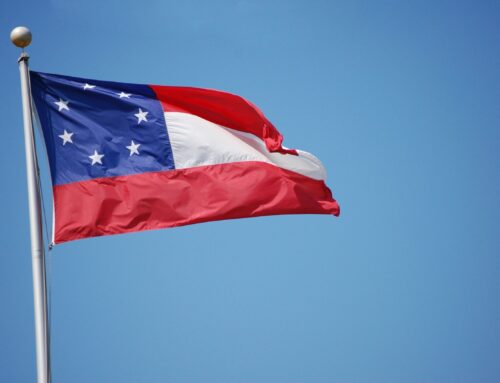If you’re sick of our foreign policy of perpetual war and yet have an instinctive disdain for all things Republican, you have an alternative to Rand Paul in 2016 – Jim Webb.
Yes, I know we’re all supposed to believe Hillary Clinton has the Democratic nomination locked up. Yet we were told that in 2008, too, until an obscure Senator named Barack Obama shot that Washington-generated bit of political wisdom down in flames. How did he do it? I would argue that, contrary to those DC know-it-alls who claim voters don’t care about foreign policy, it was her refusal to recant her support for the Iraq war that did her in – and there’s a good chance that scenario may be repeated in 2016. The reason is because Jim Webb, a former US Senator and Defense Department official (during the Reagan administration), has been an acerbic and well-informed critic of the War Party for quite some time, and he shows every sign of throwing his hat in the ring.
Born into a military family – his father was an officer in the Air Force – he joined the Marines during the Vietnam war, and went on to serve on the staff of the House Veterans’ Affairs Committee, and went on to become Assistant Secretary of Defense, and Secretary of the Navy during the Reagan years. Not only that but he’s a literary star, the author of several novels having to do with military life, as well as nonfiction and the more recent A Time to Fight: Reclaiming a Fair and Just America. He ran for the Senate in 2006 and beat the Virginia Democratic party’s preferred candidate on a platform of opposition to foreign interventionism, and rejection of Wall Street in favor of Main Street, winning the general election. Six years later, he declined to run for another term.
It’s an extraordinary thing for a politician to walk away from elected office unless he’s been disgraced by some scandal, a la Richard Nixon, or humiliated into retirement like Lyndon Johnson. Webb, however, is a different kind of politician: he had every prospect of being reelected, but he simply chose not to. As he explained to the Virginia Hampton Roads Pilot:
“My situation is different than most people up here. I didn’t come out of a law firm. There isn’t a structure that I can easily go back into. But it’s a very healthy thing, at least from the way my career has played itself out, to step out every now and then and just think about things.”
Where his thinking got him reflects the trajectory of a nation scarred by war and wondering how and why we got here. And it looks like he’s reached the conclusion many of us, on both sides of the political spectrum, came to after watching the neoconservatives hijack American foreign policy and take us down the road to successive disasters. In a review of Andrew Bacevich’s The New American Militarism: How Americans Are Seduced by War, he drew a line of demarcation between the two antagonists in the foreign policy debate:
“One side is represented heavily by those with a classical training in America’s past wars (and frequently with experience in having fought them) who would send American forces into harm’s way only if the nation is directly threatened. The other side is dominated by a group of theorists, most of whom have never seen the inside of a military uniform, who adhere to an essentially Trotskyite notion that America should be exporting its ideology around the world at the point of a gun.”
Them’s fighting words, but then again the author of A Time to Fight isn’t shying away from a confrontation with the candidate the neocons are glomming onto like vampires at a blood bank: Hillary Rodham Clinton. Her unapologetic hawkishness is being pushed by left-neocons within the Democratic party as well as (more discreetly) by right-neocons like Bill Kristol, who glories in the sheer number of prospective GOP candidates “(the more the merrier”) as a cripplingly divisive prelude to the Clinton Restoration. Sure, Hillary isn’t in tune with the neocons’ domestic policy, but then again they are all over the map when it comes to economic and social issues. On foreign policy, however, the neocons speak with one voice, and it is the voice of the war god. Just in case the noninterventionist (a.k.a. “conservative realist”) Rand Paul is nominated, it’s clear which side they’ll be on.
Speaking of Paul the Younger: there are parallels in their foreign policy stance, as well as their outsider status. Both ran against the establishment of their party – and won. Both heavily criticized the Iraq war: both foresaw in the Libyan intervention the ugly mess it turned out to be. And when it comes to Syria both have warned repeatedly against getting involved in what Webb has called “a five-sided conflict.” Webb has opined that in all likelihood some of the rebels trained by the US have found their way into the top ranks of ISIS. On domestic issues, too, there are parallels: Webb, like Sen. Paul, has worked hard on reforming a criminal justice system both see as unfair to African-Americans and other minorities.
The conventional wisdom, generated by the all-knowing pundits, is that Webb doesn’t have a chance, and Hillary is “inevitable”: even earnest liberals writing in The Nation, who like what he has to say on foreign policy issues, denigrate him as a kind of Don Quixote tilting at windmills – or, as William Greider so diplomatically puts it, “a pivotal messenger.”
Obama, too, was seen as merely a Pivotal Messenger, not a real contender, at first: he soon disabused us of that notion, much to Hillary’s chagrin. And while history never repeats itself exactly, it often comes close.
Many anti-interventionists – including not only libertarians, constitutionalist conservatives, and disaffected liberals – are wary of Sen. Paul: the first two because of his overly complex formulations that seek to balance principle with pragmatism, the latter due to their abhorrence of the GOP in general. Both Hillary and Rand have something to fear from the rise of Webb as a populist outsider: Ms. Clinton because the Goldman Sachs wing of the Democratic party is hated by the grassroots, Paul because the political energy in a presidential election year is limited. Activists (and donors) who may be drawn to the junior Senator from Kentucky may find in Webb the kind of solidity they hoped to find in Rand.
On the other hand, Webb softening up Hillary in a combative primary centered on her support for the mindless interventionism of the post-9/11 era could be a boon to the Paul campaign – that is, if Rand plays his cards right. And imagine this scenario: Paul is nominated by the GOP, while Webb beats out Hillary in a historic upset! Would Kristol’s head explode?
Another important factor that could lead to this dark horse getting considerably lighter is Webb’s compelling personal story – war hero with two Purple Hearts, a couple of Bronze Stars, a Silver Star, and incontestable personal integrity. It’s easy to see how millions of ordinary Americans, who don’t have a platform to broadcast their views as the Received Political Wisdom, would rally to his banner.






Leave A Comment
You must be logged in to post a comment.